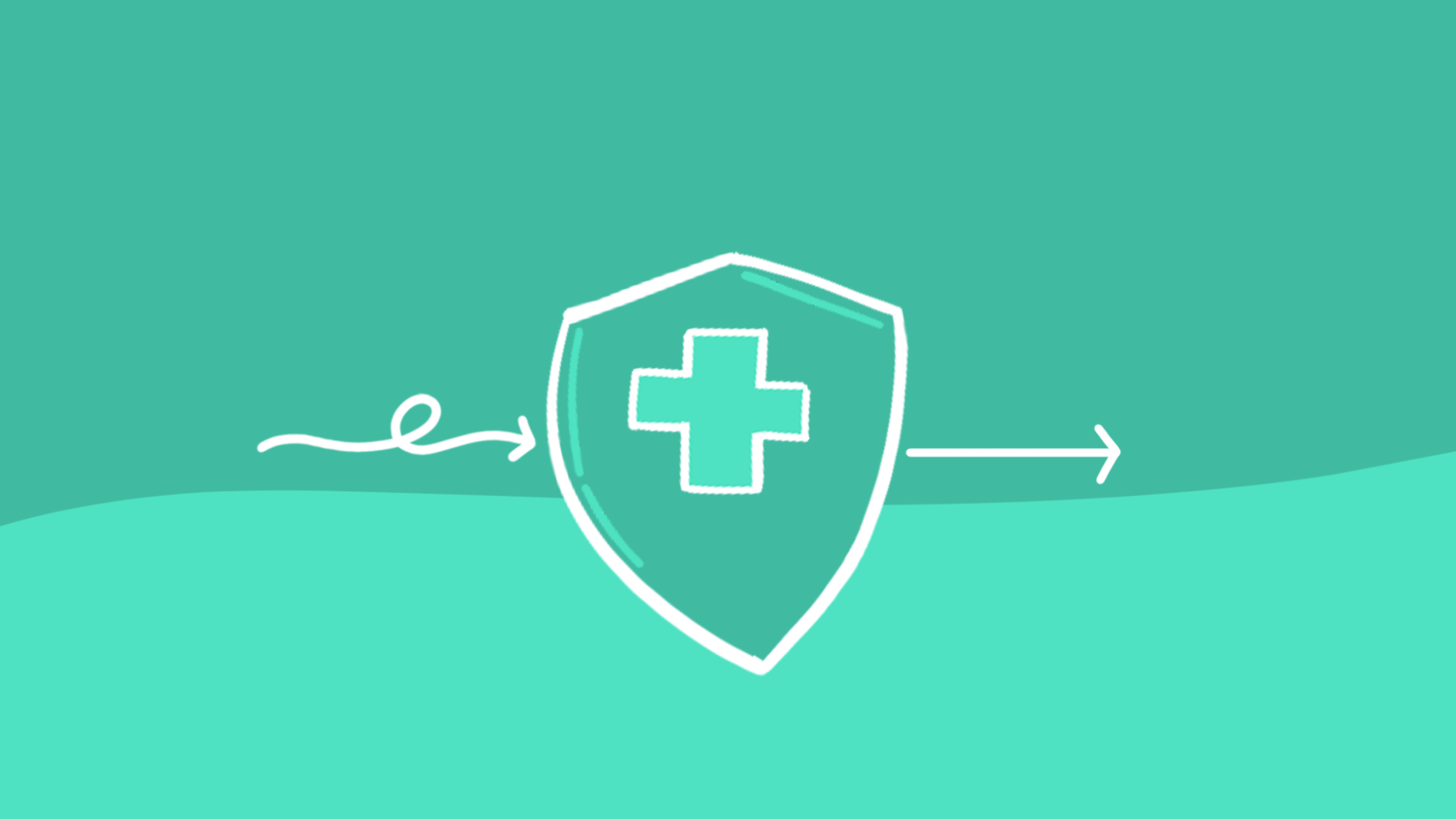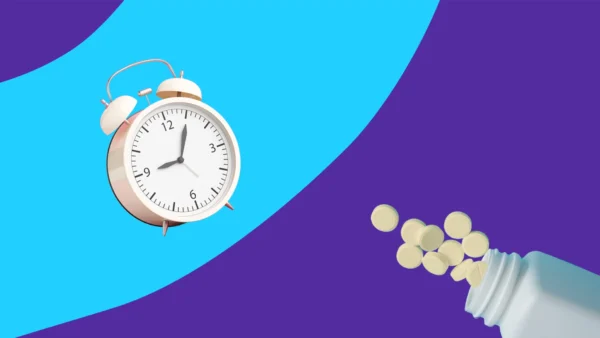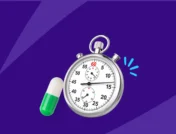In March of 2020, I had an appointment with my primary care physician. I explained to her that, even though I was on Lexapro, a selective serotonin reuptake inhibitor (SSRI), for anxiety and depression, I still felt overwhelmed sometimes. By 5 p.m. every day, when the kids were home, hungry, and wanting attention, I felt a rising panic in my chest. I’d sweat and sometimes feel dizzy. Sometimes I’d snap at my children, or I would need to take a break somewhere quiet, away from others. Last Thanksgiving, I’d been preparing and cooking for two days, only to spend most of the meal in my bedroom. I told my healthcare provider I wanted to be able to handle the inevitable stressors in my life without feeling like I was drowning.
My doctor told me I was having a flight response and my physical symptoms indicated anxiety attacks. She prescribed me propranolol, a beta blocker, for anxiety. This type of medication is typically used for blood pressure control and heart conditions. I didn’t have a history of high blood pressure or cardiac problems, but she told me taking a small dose of this Rx is a good way to deal with “sometimes” anxiety. As someone who is generally pretty sensitive to medication, I didn’t want to take something stronger or possibly addicting. I decided to give it a try.
I’m so happy I did! The pandemic shut down schools (and everything else) a week after my appointment. I found myself home 24/7 with my kids, and it felt like the end of the world was right around the corner. I was very thankful for propranolol for anxiety in those early pandemic months and now, still safe at home almost a year later.
RELATED: Anxiety attack vs. panic attack
Are beta blockers effective for anxiety?
Beta blockers were not created for the purpose of anxiety reduction. “Beta blockers are often prescribed off-label for anxiety,” explains Spencer Kroll, MD, Ph.D. in pharmacology, the director of the Northeast Lipid Association. “[Off-label use] means they are not approved by the U.S. FDA for anxiety treatment.”
Even though they are not made specifically as an anti-anxiety medication, beta blockers can help to create a sense of calm when you take them. “Beta blockers can reduce heart rate,” Houston psychiatrist Jared Heathman, MD, explains. “When anxious, our heart rate elevates. This elevation gives the brain feedback that our body is appropriately panicking. This reinforces anxiety. If you inhibit the ability to raise your heart rate as quickly, your heart can give feedback to your brain that it isn’t panicking, especially not as much as would be otherwise expected. If our heart and body is calm, it provides calming feedback to the brain. This reduces anxiety.”
Sheldon Zablow, MD, board-certified psychiatrist, calls this process a “negative feedback loop.” He prescribes beta blockers for anxiety because they “break up this cycle by limiting the body’s ability to express the physical symptoms.” Tackling the body’s physical reaction to stress helps an anxious person’s brain feel more calm and in control.
That can make a huge difference in quality of life when anxiety affects you daily. Some anxiety symptoms feel so severe, and upsetting, that people experiencing them head to the closest hospital. “There are many symptoms that bring patients into a doctor or emergency room that turn out to be anxiety,” Dr. Kroll says. These physical symptoms of anxiety include:
- Heart palpitations
- Sweating
- Itching
- Skin breakouts
- High blood pressure
- Dry mouth
- Difficulty swallowing
- Gastrointestinal issues such as stomach upset or pain
As it turns out, anxiety reduction after taking a beta blocker is actually a side effect of the drug. So, even though my blood pressure is not in the range that requires medication when I’m not feeling anxious, my clever PCP did what Dr. Kroll says “is often beneficial as a clinician,” which is “to use those side effects as part of the treatment specific to each patient.” I was worried that a benzodiazepine (like Xanax) for anxiety might make me feel too sedated to care for my kids. So, instead my PCP went with a beta blocker.
How long do beta blockers last for anxiety?
Officially, the half-life of propranolol is three to six hours, but in terms of how you feel, go ahead and plan for a couple of hours of relief. Beta blockers are usually prescribed in pill form to be taken orally. The medication works relatively quickly, reaching peak levels in as quickly as one hour. Once it’s in your system, the calming effects of a low dose of a beta blocker lasts for a few hours.
The standard dose of a beta blocker varies based on your symptoms, diagnosis, and other medical conditions. For anxiety, alone, healthcare providers usually start propranolol at a low dose, slowly increasing if necessary. There is also an extended-release version of propranolol, but for anxiety, usually the non-extended version is used.
How do beta blockers make you feel?
Beta blockers can help people who experience anxiety feel calmer and more in control of their emotions without making them feel under the influence. The goal of anxiety treatment is for you to be able to live your life without symptoms standing in your way. Beta blockers can lower the body’s adrenaline response to normal stressors, so you can focus on other things.
Unlike SSRIs—which manage anxiety and depression long-term and take several weeks to begin working—beta blockers are effective on the first use and can be used intermittently with no side effects. They alleviate short-term anxiety symptoms, but do not cure anxiety. If you are experiencing anxiety symptoms around the clock, you may need a different medication, or to use a beta blocker to supplement another prescription.
Beta blockers can be effective treatment for stage fright before events or public speaking engagements—and for sleep anxiety. “Historically, they have often been given to people for ‘performance anxiety’ before public speaking and acting,” Dr. Kroll says. Just be sure to try it at home first to see how the medication affects you before using it for a high-stress event. They may be effective for social anxiety if taken before parties or dates—a safe option for whenever anxiety emerges.
Dr. Zablow says a beta blocker “can be used in place of or with sleep aids to reduce pre-sleep anxiety. If worries about the past day or concerns about the next day increase heart rate, preventing a natural transition into sleep, this beta blocker prevents that interference.”
Side effects of beta blockers
“Beta blockers do not appear to have any problems or concerns in COVID-19 susceptible people,” says Dr. Kroll. If you are worried that a beta blocker might impact your coronavirus risk, ask your healthcare provider before starting the medication. There is potential for other adverse events from this type of medication.
Common side effects
As with all medications, there are potential side effects:
- Dizziness
- Lightheadedness
- Tiredness
- Decreased sex drive
- Nausea
- Stomach pain
- Diarrhea
- Constipation
Serious side effects
Less common, but sometimes serious side effects do occur:
- Hallucinations
- Cold hands or feet
- Muscle weakness
- Muscle cramps
- Shortness of breath
- Memory loss
- Fluid retention
- Blood sugar changes
- Insomnia and nightmares
- Allergic reaction
- Vomiting
- Shakiness
- Weight gain
- Skin rash
- Mood Changes
Seek immediate medical attention if you show signs of an allergic reaction which include: trouble breathing, wheezing, swelling of the hands or face, and/or skin rash.
Unlike traditional anxiety medications, beta blockers are not addictive. Propranolol and the like do not cause drug dependency (or withdrawal symptoms when you stop taking them) and are safe to take occasionally over a long period of time.
“Propranolol is ideal in many ways because unlike benzodiazepines often used to treat anxiety, it can be taken without concern for driving, used with pain medications, or used with alcohol,” Dr. Zablow says. “I have successfully prescribed it to reduce the doses of required benzodiazepines, antidepressants, and antipsychotics.”
I was drawn to this positive effect of the drug as a parent who often has to be “on” even in the middle of the night. I can take propranolol and have no issues feeling sober enough to drive or interact with my kids, something I cannot say for other medications such as benzodiazepines, like Xanax.
Because a beta blocker is fairly fast acting but also does not impair users to a significant degree, Dr. Zablow says “it is helpful for someone with an anxiety disorder to just carry in their pocket for the possibility of an unexpected anxiety episode—just knowing it is there can reduce the occurrence of anxiety symptoms.”
I keep the medication in my bedroom for nights when I cannot slow my busy mind down. I also keep a bottle in the kitchen for when daytime worries keep me from being my best self. I don’t need them every day, but I’m glad they’re available for when I need them.
Which beta blocker is best for anxiety?
Healthcare providers generally prescribe either propranolol or atenolol for “off-label” treatment of anxiety. Ask your healthcare provider which medication might be a better fit for you and make sure you give a full health history. Here are the basic differences between the two:
Propranolol vs. atenolol for anxiety |
||
| Brand name | Inderal LA, Inderal XL, InnoPran XL | Tenormin |
| Generic name | Propranolol | Atenolol |
| Standard dosage for anxiety | Dosages vary based on the condition and can range from 10 mg to 80 mg. For anxiety alone, a lower dose is usually prescribed. | 25-100 mg |
| Common side effects | Lightheadedness, dizziness, gastrointestinal issues | Cold hands and feet, tiredness, weakness |
| Learn more | Learn more | Learn more |
| SingleCare savings | Get coupon | Get coupon |
When beta blockers aren’t right for you
If you have chronic, uncontrolled anxiety, you may need a more regular treatment than an occasional beta blocker—such as a daily medication. Some people, like me, use a beta blocker in addition to an SSRI. Dr. Kroll says, “In general, beta blockers are well tolerated, and symptomatic drug interactions are relatively infrequent.”
Beta blockers may not be the right choice for you if you have any of the following characteristics:
- Asthma: “Beta blockers can interfere with asthma,” says Dr. Heathman. They can also cause issues if you have hyperreactive airways because the beta receptors might exacerbate breathing problems.
- Underlying medical conditions that require medication: “Beta blockers may interact with a large number of commonly prescribed drugs,” says Dr. Kroll. These include certain antihypertensive and antianginal drugs, anti-arrhythmic drugs, anti-inflammatory drugs, psychotropic drugs, anti-ulcer medications, anesthetics, cholesterol lowering agents, warfarin, diabetes medications, and some tuberculosis medications. Tell your healthcare provider about all of the medications you take, so he or she can ensure there are no drug interactions.
- Male or older age: “Beta blockers may be more effective in younger patients with hypertension than older patients and may be used to manage hypertension in females of reproductive age,” explains Dr. Kroll. Here, he is referring to it as a drug for hypertension with the added benefit of anxiety relief. Beta blockers should not be used in pregnancy unless benefit outweighs risk. So, talk to your doctor if you are pregnant or planning to become pregnant.
No drug is perfect and no person is the same. For me, as for many others like me, a beta blocker was an emotional life-saver during a very difficult time in history. The positive effects of being able to keep my cool while home with my kids, through an unprecedented time, and in the face of personal stressors, was priceless. I am very thankful my PCP thought to prescribe me a beta blocker. You cannot control life and sometimes it can be stressful—whether from a major world event, or just the everyday minutia of work and family. Beta blockers can help teach your body that, even when life is a bit too exciting, you can face it, deal with it, and even thrive.











